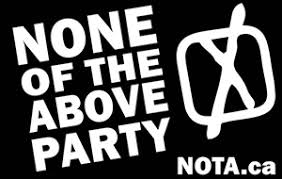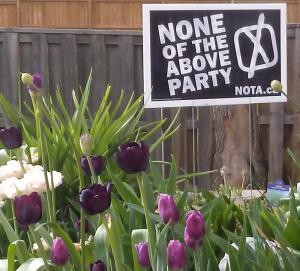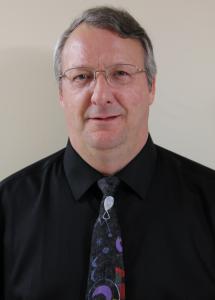None of the Above on ballot in 2019 Canadian Election

None of the Above Direct Democracy Party registering with Elections Canada, nominated 36 candidates out of 338 ridings a month before Sept. 30, 2019 deadline.
MISSISSAUGA, ONTARIO, CANADA, September 3, 2019 /EINPresswire.com/ -- The None of the Above Direct Democracy Party is registering with Elections Canada this week and it has already nominated 36 candidates in over ten percent of the 338 ridings almost a month before the September 30, 2019 deadline.
The party campaigns on the 3Rs of Direct Democracy:
1. Referendum,
2. Recall, and
3. Real Reform, both electoral and legislative that give voters control of politicians and parties.
Their candidates are accountable to their constituents and elected MPs have no central party policies or controls beyond the binding Direct Democracy principles.
Federal NOTA Party Leader Greg Vezina founded the None of the Above Direct Democracy Party of Ontario in the 2014 election with eight candidates in 107 ridings or 7.5 percent.
In the recent 2018 election they increased the number to 42 in 124 ridings or 30 percent of ridings, growing faster than the Greens or Libertarians.
Among star candidates in 2018 running again in 2019 are Adam Nobody, whose complaint about a police officer's conduct during the G20 sweep led to a criminal assault conviction for the officer, Daniel Preston the son of former Ontario PC MPP Peter Preston, and a man who legally changed his name to Above Znoneofthe so he could appear last in an alphabetical list of candidates on a ballot.
Also running in the 2019 federal election are Adam Cassidy the son of former Ontario NDP leader Michael Cassidy, and a number of others to be announced.
If elected to form government, the NOTA Party would start by asking the best qualified MPs from all parties to join a unity cabinet while allowing them to sit with the parties who elected them.
Leader Greg Vezina says, “We would change the partisan, party-based system of special interest, identity politics politicking in Canada for one that respects your community and the public good.”
In the first 100 days, a NOTA-led government would pass every Bill where there is agreement or consensus among most MPs from all the parties elected.
Within six months, they would send out to all registered voters a referendum information package on everything proposed by the government and the opposition to it. To have their referendum votes counted, voters would reply within 30 days.
They will use the next six months ending their first year passing those Bills with the most public and MP support from the parties in the House, and from then on allow referendum, plebiscite or recall ballots by the people to decide everything else.
The Canadian NOTA Direct Democracy Parties are part of a worldwide None of the Above movement of new and independent parties and candidates campaigning for direct democracy and voter empowerment policies supported by voters and non-voters alike. In some instances NOTA is a negative option vote similar to declining a ballot as is presently allowed in the Canadian provinces of Ontario, Manitoba, Saskatchewan and Alberta.
Previous attempts to allow a declined ballot or NOTA options in federal elections have failed.
A private member’s bill was introduced in the House of Commons in 2001 proposing amendments to the Elections Act that would permit an elector to formally decline the ballot, but it was not supported by any of the parties with status. Other Chief Electoral Officers’ recommendations to Canadian legislatures to so the same have been refused.
In a November 2018 Charter challenge a University of Ottawa law student argued for “none of the above” to be counted and noted in federal elections. In its dismissal the Court wrote “The public will never know how many ballots, if any, were cast with a view to rejecting all the available candidates”.
The June 7, 2018 Ontario election had 14,988 declined ballots, the third highest number at about ten times the average since 1975 when declined ballots were allowed. It was the first time since 1975 that Elections Ontario did not publish a summary of declined, rejected and spoiled ballots in the unofficial or official results. This has not yet been reported by the media.
According to research by PEW Research direct democracy, a governing system where citizens, not elected officials, vote directly on major national issues, is supported by roughly two-thirds of the public1 around the world, with little difference in views between regions.
According to recent research and polling in Canada 53% of survey respondents do not support any of the traditional parties2 and 70% feel government doesn’t care what ordinary Canadians think3.
NOTA Party leader Greg Vezina says, “Direct Democracy is people over politics. It is time all Canadians had referendum and recall laws like voters used in the province of British Columbia.”
Website: https://nota.ca
Greg Vezina
None Of The Above Direct Democracy Party
+1 905-501-0010
email us here
Visit us on social media:
Facebook
Twitter
WATCH NOW: 2015 General Election analysis and Greg Vezina’s view about newly elected Liberal majority government at http://www.youtube.com/watch?v=NGbyCBQi2y0

1 https://www.pewresearch.org/global/wp-content/uploads/sites/2/2017/10/PG_2017.10.16_Global-Democracy_0-01.png?w=640
2 http://angusreid.org/election-2019-issues/
3 https://www.cbc.ca/news/canada/british-columbia/sfu-study-democracy-populism-immigration-sylvester-1.5260422


